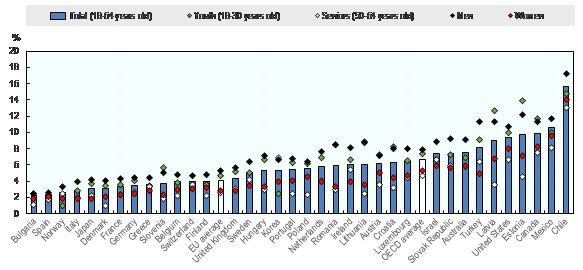Inclusive Entrepreneurship
What is inclusive entrepreneurship?
Entrepreneurship plays an important role in the economy as it is a driver of innovation and job creation. It also holds potential for strengthening social inclusion by offering another option for earning income and contributing to society. However, this potential will not be realised until everyone has an opportunity to start business and be successful in self-employment. This is not yet the case as many population groups such as women and seniors are under-represented in business creation and self-employment, while others such as youth often start businesses that tend have low survival rates.
Women and seniors are less likely to be actively involved in business creation
Share of the population engaged in starting a business (18-64 years old), 2014-18

Note:This figure shows the nascent entrepreneurship for different population groups. This rate is defined as the proportion of the adult population (18-64 years old) that is actively involved in setting up a business they will own or co-own; this business has not paid salaries, wages or any other payments to the owners for more than three months. All EU and OECD countries participated in the GEM survey between 2014 and 2018 except the Czech Republic and Malta. Several countries did not participate in the survey in every year: Australia (2018), Austria (2015, 2017), Belgium (2016-18) Bulgaria (2014), Cyprus (2014-15), Denmark (2015-18), Estonia (2018), Finland (2017-18), France (2015), Hungary (2017-18), Japan (2015-16), Korea (2014), Latvia (2014, 2018), Lithuania (2015-18), Mexico (2018), Norway (2016-18), Portugal (2017-18), Romania (2016-18), Turkey (2014-15, 2017).
Source: Global Entrepreneurship Monitor (2019), Special tabulation of the population surveys bewteen 2014 and 2018.
The objective of inclusive entrepreneurship policies is twofold. First, they seek to increase awareness about the potential that self-employment as a labour market activity and to build motivations to pursue it. Second, they seek to address market (e.g. information failures, externalities), institutional (e.g. poorly adapted regulatory environments), and behaviour failures (e.g. excessive fear of failure) that disproportionately affect people in under-represented and disadvantaged groups. Inclusive entrepreneurship policies typically target groups that are under-represented in, or face greater barriers to, business creation, i.e. women, youth, the unemployed, seniors, and migrants.
Addressing these barriers with initiatives such as entrepreneurship training, coaching and mentoring, microfinance would be expected to lead to an increase in business creation by these groups. It would also improve the quality of the start-ups so that they are more sustainable and innovative.
These policies can also contribute to stimulating economic growth. For example, it was estimated in 2014 that closing the gender gap in entrepreneurship would increase global GDP by as much as 2%, or USD 1.5 trillion (approximately EUR 1.3 trillion).
However, another important outcome sought by inclusive entrepreneurship policies is to improve labour market attachment. By helping people acquire skills and work experience, and build networks, they also become more employable.
Related Documents